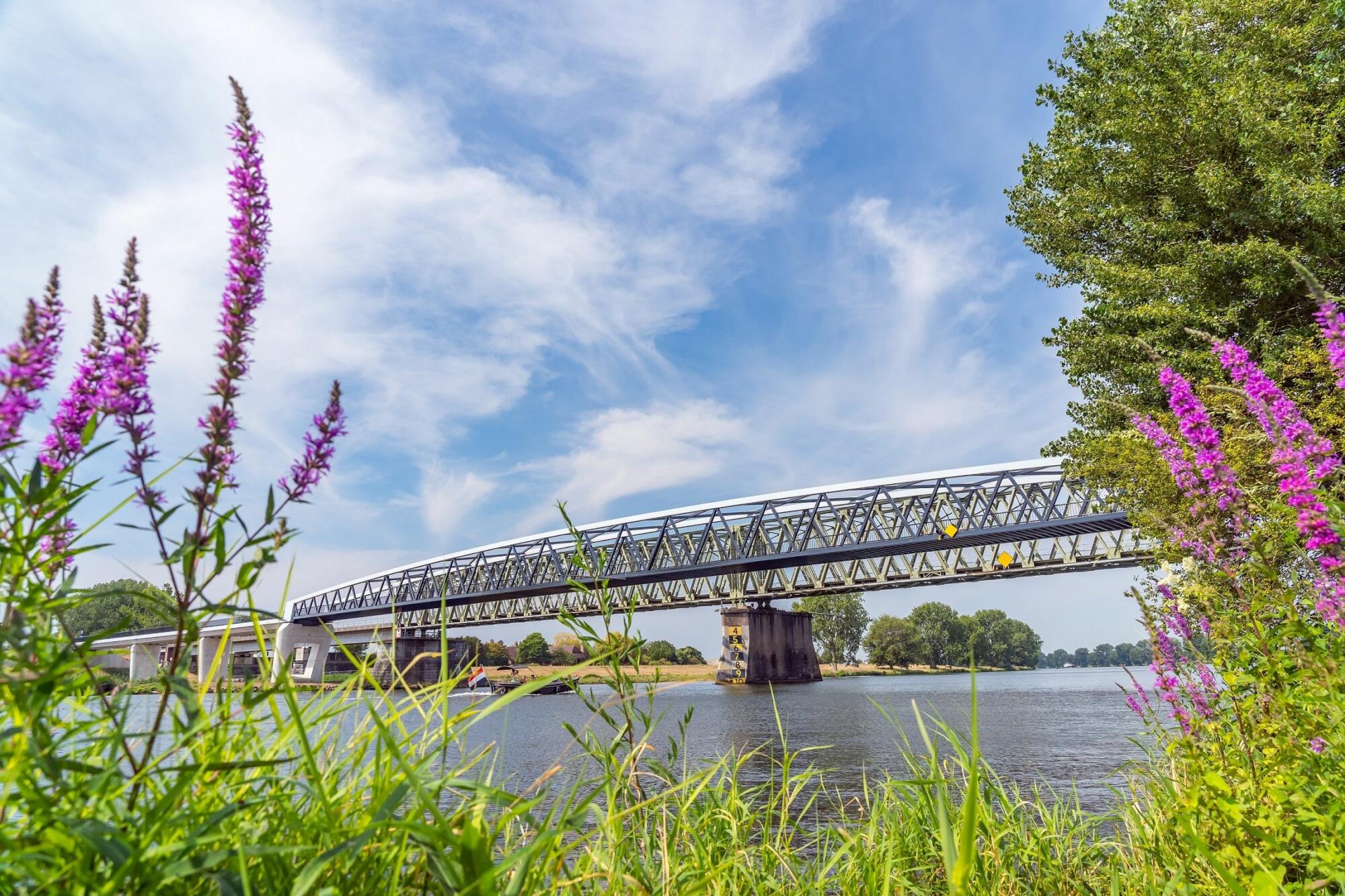Fostering Relations: An introduction to the Arnhem-Nijmegen City Region
Arnhem-Nijmegen City Region played virtual host to the POLIS 2020 Annual Conference. Innovation meets collaboration with impressive results...
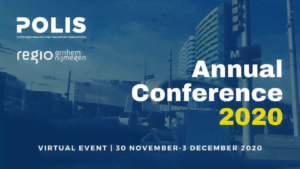
The POLIS 2020 Annual Conference
The POLIS 2020 Annual Conference was co-hosted by Arnhem-Nijmegen and although due to disruption caused by COVID-19 the event used a virtual platform, the region remains a critical partner. We spoke to the Mayor of the City of Arnhem Ahmed Marcouch, and the Chairwoman of the Mobility Platform of the Arnhem-Nijmegen City Region Harriet Tiemens, about the meaning behind hosting the POLIS Conference, the innovative mobility solutions within the Region and the close collaboration between the cities of Arnhem and Nijmegen.
Thinking Cities (TC): This year the Arnhem-Nijmegen region is co-hosting the Polis 2020 Conference. Why did the green metropole region put itself forward for this role?
Ahmed Marcouch (AM): The Arnhem-Nijmegen City Region is a green metropolitan region, bordering Germany, that contributes to European climate ambitions. Our region is situated in between great nature reserves and our cities are full of city parks. For our region, making mobility more innovative and sustainable is a major challenge. We cannot solve this puzzle by ourselves, we must learn and exchange with other cities and regions in Europe.
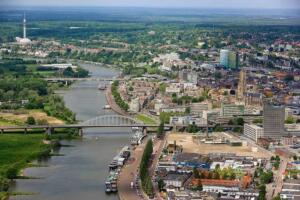
Aerial view of Arnhem-Nijmegen City Region
Harriet Tiemens (HT): Taking part in the POLIS Conference allows us to do so. POLIS is the leading network of European cities and regions committed to innovation in Urban Mobility and Transport. The 2020 POLIS Conference will virtually bring together 600 professionals and policy makers to present their concrete and pioneering urban mobility actions. The Arnhem-Nijmegen City Region will take the opportunity to share its own ambitions, innovations and developments in the field of smart and sustainable mobility to the POLIS Network. We have a lot to offer to the general discussion… and much to learn!
TC: Today, sustainable mobility is more important than ever. The POLIS Conference will discuss the challenges and opportunities cities and regions face. What do you think is needed to make mobility in Europe more sustainable?
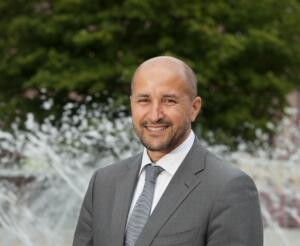
Ahmed Marcouch, Mayor of Arnhem City, Chair of Arnhem-Nijmegen City Region (image courtesy Ahmed Marcouch)
AM: The POLIS Conference supports exchange of best practices across Europe. I believe firmly that for Europe to succeed on challenges like its Green Deal targets on mobility and cope with the disruption caused by COVID-19 this knowledge exchange is critical. It will serve the progress towards a more sustainable mobility system.
HT: I am looking forward to the Green Deal-Makers Summit. Local and regional political representatives will engage in a dialogue with EU representatives to show their side of the Green Deal and discuss how the EU can support the local and regional level to perform even better! December marks a year since the EU Green Deal was presented. The Green Deal is a roadmap to a more sustainable Europe with a very clear goal: making the European Union climate neutral by 2050. We now want to take the next step by creating opportunities for cities and regions working on sustainable mobility and scale up the presented solutions.
TC: What will the Arnhem-Nijmegen Region showcase during the POLIS 2020 Conference?

Harriet Tiemens, Deputy Mayor of the City of Nijmegen, Chair of mobility for Arnhem-Nijmegen City Region (image courtesy Harriet Tiemens)
HT: Our Region is a hotspot for (international) logistics and sustainable mobility solutions. It is perfectly situated between the European hinterland and Netherlands’ two most important mobility and shipping hotspots: Schiphol and Rotterdam. One of the ambitions of the Arnhem-Nijmegen City Region is to make 'zero emission' inland shipping happen, so that the Region’s action will translate into climate neutrality by 2050. In addition, the Region is working on a cleaner living environment in and around the cities. In order to make Gelderland and the Region more accessible, we focus on travellers and encourage smart and clean mobility and we aim at connecting, changing and greening, using hubs as far-sighted links for travellers and freight transport.
We also promote traffic flow on national highways (A50 and A12) and we are committed to implementing High-Quality Public Transport (HOV). In addition, we are improving the quality of short-distance traffic (cycling and walking) by developing several hubs in the outskirts of the cities. Mobility services such as eHUBS, cross-border mobility (EUREGIO) and fast cycle routes establish a joint approach for changing mobility behaviour and sustainable (urban) logistics.
These fast cycle routes are perhaps what I am most proud of when it comes to our mobility infrastructure. Thanks to our commitment to cycling, it is probably faster to cycle to your destination in the city than it is to drive! Not to mention the health benefits cycling brings. Our bike networks connect the city centre with surrounding villages, serving not just the city residents, but the entire region. They also meant that when COVID-19 struck, our mobility infrastructure was ready and waiting!
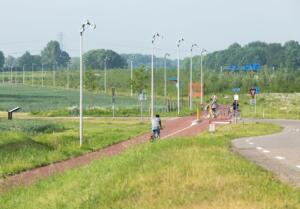
Fast cycle route RijnWaalpad between Arnhem and Nijmegen
TC: What will the Arnhem-Nijmegen Region showcase during the POLIS 2020 Conference?
AM: We present 'Meet the Dutch'. These are 30-minute interactive sessions each day in which participants can engage in conversation with mobility experts. Led by a moderator, participants will be shown a series of inspiring regional best practices. Sessions will explore topics, including mobility hubs, energy systems, changing behaviour and sustainable corridor innovations. Some of the projects discussed are Nijmegen Centraal and CleanMobilEnergy – a project the City of Arnhem is a pilot of. We look forward to seeing people there!
HT: The cooperation we have fostered between the cities of Arnhem and Nijmegen offers a blueprint for other regions. In Nijmegen we have established innovative parking solutions and our fast-cycling network of bike paths which each terminate at a major mobility hub. Meanwhile, Arnhem is pioneering new hydrogen technologies and electric vehicle charging facilities. Both cities share knowledge, learning from each other’s best practices and coordinating their efforts. The POLIS conference is an opportunity for regions to show how they are collaborating, and Arnhem-Nijmegen certainly achieves this.
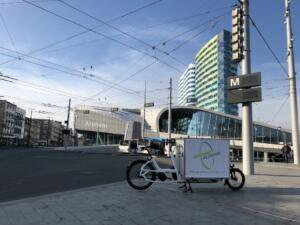
Clean city distribution with e-cargobike in Arnhem
TC: How is the Arnhem-Nijmegen City Region making its own mobility infrastructure more sustainable?
HT: The City faces several challenges. One such challenge is traffic management. Car traffic to and from the Heyendaal campus of Radboud University, Radboudumc, Technovium and Hogeschool van Arnhem and Nijmegen (HAN) must decrease by 20% in the coming years. We also require more green space. For example, the Nijmegen campus and surroundings must remain sustainably accessible and road safety must be improved, even and above all after the COVID-19 crisis. We are working on a range of solutions, and the aim is for the traffic flows on campus to be CO2 neutral by 2030. Cycling, walking and public transport will soon be the norm. One of the ways to achieve this is improving the busy Heyendaal station, where around €13m will be invested in the coming years in, among other things, wider platforms and enhanced connections with the campus.
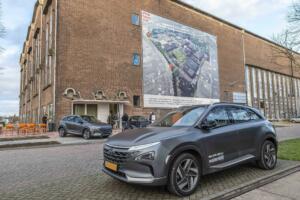
One of the 70 hydrogen-powered cars driving in Arnhem in 2020
AM: With its world-famous clean trolleybus, Arnhem has had a sustainable infrastructure for 70 years. Our region also holds good connections with our eastern neighbours; and we are a frontrunner in hydrogen, but more is needed. The Arnhem-Nijmegen City Region is also expanding and enhancing cycle paths in the Region. The aim is for more people to take the bicycle to travel quickly, safely, and comfortably from home to work, reducing car traffic and CO2 emissions. A higher number of cyclists translates well into better accessibility to the Region. In recent years we have built several fast cycle routes, such as those between Arnhem and Nijmegen (RijnWaalpad) and between Beuningen and Nijmegen: these have allowed us to construct a cooperation with surrounding provinces and municipalities and to facilitate faster, safer and more comfortable cycling. Moreover, the routes are direct and have, were possible, priority over car traffic.
HT: I am very proud of our dedication to sustainable mobility here in the Arnhem-Nijmegen City Region. Fostering cooperation between the two cities, and surrounding villages, we have created fast, efficient, and sustainable transport options, and continue to do so.
About the authors:
Climmy Hanssen is Communications Advisor at Arnhem-Nijmegen City Region in the Netherlands, climmy.hanssen@arnhem.nl
Isobel Duxfield is Communications Assistant at POLIS Network, iduxfield@polisnetwork.eu
